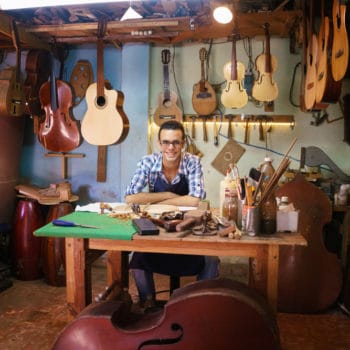Why We Love It
-
$95,810Potential Avg. Salary*
-
Growing DemandJob Outlook
* Salary & growth data is based on the recent Bureau of Labor and Statistics data published at https://www.bls.gov/oes/current/oes131011.htm for 13-1011 Agents and business managers of artists, performers, and athletes 11/2021. Based on national data, not school-specific information. Conditions in your area may vary.
With a bachelor of science in recording arts, you can explore the latest techniques and technologies in music production, including studio recording and sound reinforcement.
Students learn how to engineer sound recording for studio-produced music, how to record live shows for mass production, and how to use audio synthesis techniques to alter the sounds and voices in recorded music for varying effects.
What is a Degree in Recording Arts?
For individuals interested in music—its composition, production, engineering, and technology—a degree in recording arts provides the education needed to do what you love. Students learn how to write songs, compose music, record music in studios and live, and alter recorded music with differing technologies.
Graduates of recording arts programs may go into the music-making business, creating music for bands, musicians, video games, movies, and/or TV shows as musicians, composers, or producers.
Other graduates of recording arts degree programs move into the management and marketing side of the business. These students focus their coursework on music business topics, such as entertainment law, entertainment marketing, and business administration and management.
With the education received in a recording arts program, these students can move into management careers after graduation, working as band managers, talent agents, recording studio owners, or event planners.
Recommended Schools
What Courses Would I Take For a Major in Recording Arts?
- Audio Technology
- Audio Techniques
- MIDI and Computer Music
- Multitrack Studio Techniques
- Sound for Picture Production
- Recording Arts
- Audio Technical Crew
- Advanced Sound Reinforcement
What Jobs Can You Get with a Degree in Recording Arts?
Graduates from recording arts bachelor’s degree programs have a wide variety of career options after graduation, so finding work in the field should be relatively simple.
Some of the best opportunities come in teaching and composition. Students can teach music or in elementary schools and after-school programs, or they can create music for TV shows, movies, commercials, or even royalty-free music websites. Finding a career as a band manager or popular music composer is also doable, though more difficult and competitive.
How Long does it take?
A bachelors in Recording Arts will have a typical length of 4 years in a full time schedule. That said, there are many ways to speed up the timeframe by either taking more units via online coursework, community college, or taking free classes at OnlineDegree.com that could transfer to universities in the US.
Recommended Schools
Best Jobs for Recording Arts Degrees
Recording arts graduates are prepared to enter the workforce in a variety of careers. Some work as band managers, scheduling shows and promoting musicians. Some build and run their own recording studios, renting studio space to bands and musicians.
Others go into music composing and write songs for bands, orchestras, commercials, TV shows, movies, or animations. Some also go into music education as teachers.
How to save time and money
Our mission is to help you to avoid paying full price for college. We want your Recording Arts degree to be affordable and accessible. Here’s how you could save:
Create Your Free SmartPlan

There are many ways to make college affordable and accessible.
That’s why we created a helpful tool called SmartPlan.
It’s free, and helps you find potential ways to save and tons of information about each school you’re considering
Think of it as your “college blueprint”, to help you instantly craft a path to your degree:
- Which Colleges Match Your Needs
- Ways You Could Save Time & Money
- Free Courses You Could Take for Credit
- Valuable Data and Insights on Each College
- Detailed Steps You Should Take!
See what’s possible for you and generate a free plan within just a few minutes
Create My SmartPlanGet a Certificate in Recording Arts First
A certificate program generally requires less than a year to complete, and upon completion, students can find entry-level work in the industry.
This allows them to find work sooner and earn professional experience and income while pursing a bachelor’s degree. Additionally, the credits you earn in your certificate program may transfer, reducing the number of courses required to earn a bachelor’s degree.
You Might also be Interested in
Many visitors who look for a degree in Recording Arts are also interested in the following degrees.











